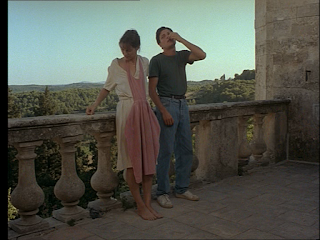Roberto Rossellini's "Viva L'Italia" (1961)
In 1964, Rossellini exclaimed: "Of all my films, I'm proudest of Viva L'Italia."
About one and a half hours into the film, a singer meets Garibaldi and expresses his joy as follows, describing perfectly Rossellini's own cinema (French translation of the Italian original):
"Devant toutes ces beautés rares, je suis venu ici, et ce soir je veux chanter quantité des chansons. Des chants sans apprêts, écrits comme ils venaient, sans style, ni prétention, qui font parler le coeur."
My English translation:
"Before all these rare beauties, I came here, and tonight I want to sing many songs. Songs without preparations, written as they came, without style, or pretension... Songs which make the heart speak."
In his book, Tag Gallagher writes the following about the war scenes in Viva L'Italia, where the camera constantly zooms in and out, pans around, telling the story of the battle with extraordinary precision, and beauty: "... a new era in cinema: never before has a camera done anything like this, never before have we seen anything so vast." And later in the book: "... Viva L'Italia erupts into a crescendo of liberation across an ever-expending space."
Zach Campbell also wrote beautifully about the war scenes in his own blog.
Talking about Viva L'Italia, Andrew Sarris mentions Rossellini's camera that "keeps its cosmic distance." And later in the same paragraph, he states: "Where Buñuel's ideas sometimes transcend his images, and where Chaplin's images sometimes transcend his ideas, there is in Rossellini little or no separation between style and substance. If there be such a thing as a cinematographic language, and I firmly believe there is, Rossellini requires the least translation..."
One of the things I like the most about the film is its courage to emphatize with history, and its characters (notwithstanding the "cosmic distance" that Sarris talks about). The chants and hymns on the soundtrack or the ideological exclamations might feel naive to many but Rossellini only makes movies about the things he feels, and by feeling Garibaldi's followers, he makes us understand a very important point in recent history: the formation of nation-states. As Tag Gallagher says, what interests Rossellini "is always the moment when one cycle of history is dying, another is born." At the very beginning of Viva L'Italia there's an important emphasis on telegrams, and later, on mass printing of newspapers. Without the changes in mass communication, history would have happened very differently. Rossellini allows determinism, understands the forces that drive history, but also embraces the human beings who drove it, Rosa being a great and heroic example.

Comments
If you can direct me to where I can find Viva I'italia 1961 by Roberto Rossellini it would be greatly apprisiated.
Thank you
Alessandra
please respond to:
alessandra@dowdyco.com
i'll be happy to send you a copy though, i'll email you soon...
http://www.starscafe.com/es/pelicula/viva-italia.aspx?e=sergio-amidei-actor